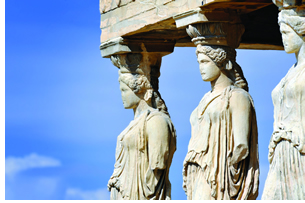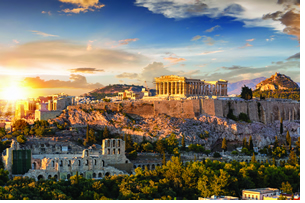
An Ignored and Forgotten God – Part 1
Notable parallels between the incident of Paul at the Areopagus and the world today, and what it means for us.
An event took place almost 2,000 years ago that has amazing parallels to the current day. We read in Acts 17:16-34:
“Now while Paul was waiting for them at Athens, his spirit was provoked within him as he saw that the city was full of idols. So he reasoned in the synagogue with the Jews and the devout persons, and in the marketplace every day with those who happened to be there. Some of the Epicurean and Stoic philosophers also conversed with him. And some said, ‘What does this babbler wish to say?’ Others said, ‘He seems to be a preacher of foreign divinities’—because he was preaching Jesus and the resurrection. And they took him and brought him to the Areopagus, saying, ‘May we know what this new teaching is that you are presenting? For you bring some strange things to our ears. We wish to know therefore what these things mean.’ Now all the Athenians and the foreigners who lived there would spend their time in nothing except telling or hearing something new.
“So Paul, standing in the midst of the Areopagus, said: ‘Men of Athens, I perceive that in every way you are very religious. For as I passed along and observed the objects of your worship, I found also an altar with this inscription: “To the unknown god.” What therefore you worship as unknown, this I proclaim to you. The God who made the world and everything in it, being Lord of heaven and earth, does not live in temples made by man, nor is he served by human hands, as though he needed anything, since he himself gives to all mankind life and breath and everything. And he made from one man every nation of mankind to live on all the face of the earth, having determined allotted periods and the boundaries of their dwelling place, that they should seek God, and perhaps feel their way toward him and find him. Yet he is actually not far from each one of us, for “In him we live and move and have our being”; as even some of your own poets have said, “For we are indeed his offspring.”
“Being then God’s offspring, we ought not to think that the divine being is like gold or silver or stone, an image formed by the art and imagination of man. The times of ignorance God overlooked, but now he commands all people everywhere to repent, because he has fixed a day on which he will judge the world in righteousness by a man whom he has appointed; and of this he has given assurance to all by raising him from the dead.’
“Now when they heard of the resurrection of the dead, some mocked. But others said, ‘We will hear you again about this.’ So Paul went out from their midst. But some men joined him and believed, among whom also were Dionysius the Areopagite and a woman named Damaris and others with them.”
When the Apostle Paul arrived in Athens, he walked through the city while he was waiting for his co-laborers. Athens was one of the most important cities of the time, especially in the realms of culture, sports, and religious fervor. But sometimes people who are exceptionally skilled and knowledgeable are also superstitious. This was certainly true in Athens: The population was completely addicted to idolatry. And so, Paul debated with four groups of people there: the Epicureans, the Stoics, the Jews, and the “devout persons.”
The Jews were proud of their religion and Law, believing it made them special and superior to everyone else. They believed they were gaining God’s favor by observing rituals.
 In addition, there were two philosophical camps originating in Athens. The Epicureans derived their name from the philosopher Epicurus, and their philosophy focused on making pleasure (rather than wisdom) the goal of life. The Epicureans were materialists. Although they didn’t deny God’s existence, they held that He didn’t interfere in human affairs. They also believed that when a person dies, the body and soul are annihilated. In other words, they essentially lived to enjoy the here and now.
In addition, there were two philosophical camps originating in Athens. The Epicureans derived their name from the philosopher Epicurus, and their philosophy focused on making pleasure (rather than wisdom) the goal of life. The Epicureans were materialists. Although they didn’t deny God’s existence, they held that He didn’t interfere in human affairs. They also believed that when a person dies, the body and soul are annihilated. In other words, they essentially lived to enjoy the here and now.
By contrast, Stoic philosophy emphasized knowledge as life’s primary goal. In Paul’s day, Athens was famous for its elite culture, wisdom, philosophy, and fine arts. It could be said that the people there worshiped knowledge or human wisdom. Anyone who came with great knowledge and learning was welcomed with open arms. The Athenians specialized in philosophical discussion, and the Stoics were pantheists striving to live an honorable life. They were industrious and considered themselves distinguished, worthy people who had earned the right to feel superior to others.
The Dead Ends
The various groups that Paul encountered still exist today. They may vary somewhat, but the characteristics are the same. We can relate much of today’s mindset to these groups.
The ones who are always looking for something new: Our text says that the people of Athens were characterized by their constant pursuit of the new, and things are similar today. People are always looking for every possibility of security, peace, hope, or well-being. And because there is always something new to try, they’re always trying something different. But that’s just evidence of the lack of something truly secure and effective. We’re living in an age of relativism, where everyone has their own truth that they expect others to respect.
That tells us something very serious. If there are many (often contradictory) truths, then there can’t be an absolute truth. That’s why our time is often rightly referred to as a post-truth age. But what a tragedy it is for mankind when absolute truth no longer exists … when there’s nothing to justifiably believe in and everything is relative, depending on how it feels or personal preference! This leads to enormous uncertainty. There’s nothing to hold onto, or be sure of, that won’t fail.
People seek happiness, security, and assurance in various ways. They run back and forth, always hoping to find the meaning of life. But what they find only lasts a while, and then they’re frustrated after yet another disappointment. Some people even visit churches out of curiosity, to try something new. They see Jesus as just a great teacher and the founder of a new religion—one of many, just one more way. Some even find comfort in the love they receive within the church, but only until something comes along that’s more interesting, entertaining, or a “better fit” for their needs.
The ones who are living for pleasure and materialism: There are people who, in the manner of the Epicureans, live their lives in a way that follows pleasure. They live by the motto, “You only live once.” As a result, many do whatever satisfies their desires.
 Parties, friendships, hobbies, entertainment, travel, sex, perhaps alcohol and drugs, and many other things are some of the means they use to achieve their supposed happiness. But how quickly they pass! Soon they’ll need to revisit these things, or find something else that’s more enjoyable to achieve the same result. This is very closely related to materialism, which accepts the “haves” of society and rejects the “have-nots.” This results in a constant pursuit of material goods. We’ve become a consumer society, because many people hope to find their happiness that way.
Parties, friendships, hobbies, entertainment, travel, sex, perhaps alcohol and drugs, and many other things are some of the means they use to achieve their supposed happiness. But how quickly they pass! Soon they’ll need to revisit these things, or find something else that’s more enjoyable to achieve the same result. This is very closely related to materialism, which accepts the “haves” of society and rejects the “have-nots.” This results in a constant pursuit of material goods. We’ve become a consumer society, because many people hope to find their happiness that way.
But what has been gained can be quickly lost! Even the newest and fastest car, a new house or a tropical vacation doesn’t fill the void. Besides, there will always be someone else who has more, and better. This results in frustration and a desire to succeed, trapping people in a vicious cycle where they can’t find peace.
The ones who want to be good people: There are also the moralists, who believe they are good and useful to society. Unlike the ones who live for pleasure, they see their life’s purpose as doing good for others. They’re the first ones to support the construction of a new children’s home or school in Africa. They donate to help fight world hunger. They support refugees, and maybe even an environmental movement. They often feel superior to others who don’t contribute to these causes. A lot of what they’re doing is great. But does it really lead to lasting happiness and security?
The ones who seek wisdom and knowledge: The Athenians were very well-educated. Like them, many people today are seeking wisdom, titles, and self-actualization. The world is increasingly characterized as a knowledge cult.
I’m not against studying; I do so myself. But many today are finding their identity in knowledge, and are proud of what they know and have achieved. The Bible even says that knowledge causes pride (1 Cor 8:1). It has become a form of religion, and helps people make sense of the world. They find fulfillment in showing off their knowledge and knowing more than the next person, winning arguments, and gaining recognition for their accomplishments. However, no matter how much knowledge, wisdom, and recognition they gain, they still don’t find lasting fulfillment in life. They don’t realize they need God, because they’re relying so much on their own abilities.
The ones who are religious: Then there are those who see religion as a way to God, heaven, or a higher purpose. They strictly adhere to rituals and commandments. They believe they’ve earned a better position through their piety and good deeds. They feel that God must be pleased with them if they’re attending church, donating to charity, and doing community service.
 We can see that there are still different philosophies toward life today, just as there were in ancient Athens. But they all have one thing in common: They’re missing something. That causes people to be dissatisfied, aggressive, selfish, and more. It’s even one of the factors behind the rise in poor mental health and suicide rates. Nothing is completely certain.
We can see that there are still different philosophies toward life today, just as there were in ancient Athens. But they all have one thing in common: They’re missing something. That causes people to be dissatisfied, aggressive, selfish, and more. It’s even one of the factors behind the rise in poor mental health and suicide rates. Nothing is completely certain.
Which of these attitudes or philosophies are you inclined toward? Do the paths you’ve taken bring the peace you’re longing for, true contentment, security now and for the future? All of the philosophies we’ve discussed are dead ends that only add to the frustration and discouragement we feel, making us increasingly desperate in our search for the real solution. We may be convinced that our lifestyle is the right one. But whatever our attitude has been, do we have the humility to examine what God says and offers us, so we can make the truly right decision?
The Only Way
The unknown or ignored God: As he addressed the Athenians, Paul pointed out that despite everything they were, had, and did, they had forgotten what was essential and important. He had come into a very religious society, which worshiped over a hundred deities— including many associated with people’s preferred lifestyles. In many cases, people were giving free rein to their baser instincts, such as when they worshiped the god of wine or the goddess of fertility.
There were indeed some who were sincere in their worship of these deities (which were represented corporeally in various ways). But none of these idols were capable of answering their prayers, moving, or approaching them. Fearing that they had forgotten some deity that might later turn against them, the people had even erected an altar “to the unknown God” (Acts 17:23). As he spoke to them, Paul said they were in ignorance (v. 30). Although they were some of the most knowledgeable people of their time (and the teachings of their thinkers are still esteemed and studied today), they didn’t know the one thing that was most important for their life and eternity. They were ignoring the true God.
When I consider our society, I’m convinced that if Paul were here today, he’d have to say the same thing of us. The God of the Bible is a stranger to most people. We can find a modern-day parallel to the Athenians’ altar with its inscription “to the unknown God,” when we look at the massive, wonderfully designed cathedrals in Europe. Millions of people visit them annually, taking photos, studying the architectural details, associating them with kings who once ruled … utterly ignoring the purpose for which they were built.
Many people don’t even know who Christ is. If we were to take a poll in school today and ask the students who they think Jesus was, some won’t know how to answer.
A few years ago, I was speaking with a member of the Gideons, an organization which distributes New Testaments to schools, prisons, hospitals, hotels, and more. I asked him how he perceived the state of interest in God. He replied, “I can illustrate this from personal experience. One time, we were distributing New Testaments in front of a school, and I offered one to a 12-year-old. He asked me what it was, and I told him it was part of the Bible and was about God. The boy responded, ‘What do I need God for?’”
God isn’t just unknown, but deliberately ignored by many.
The representation of the unknown and ignored God: Paul was invited to present and defend this new faith in the Areopagus. The Areopagus was a place of judgment where judges, sages, and officials gathered to discuss the city’s affairs and administer justice (although Paul was brought there out of curiosity, not because he’d been accused of a crime).
The Apostle first emphasized the Athenians’ religiosity, telling them, “I perceive that in every way you are very religious” (Acts 17:22). The underlying Greek word for the worship of deities is deisidaimon, which means a high degree of both superstition and reverence (deido: fear; daimon: demon or pagan god). It’s striking that the original word includes the concept of a demon. The Apostle points out elsewhere that worshiping idols is akin to demon worship (1 Cor 10:20). God clearly forbade the worship of any being or object (Ex 20:4-5). So, anyone violating this clear commandment, even if the object bears the name of a saint, is opening themselves up to monstrous influences.
Then Paul showed them that there is one true God who created heaven and earth, as well as man. Thank God we’re a special, creative act of a loving God, not just the product of chance (or an explosion). His emphatic interest was in man’s creation. This God doesn’t need temples to dwell in or people to bring Him food, because He is the Creator of everything.
Paul says elsewhere that man should conclude in favor of God’s existence by observing creation (Rom 1:18-21). If we’re being honest, looking at the beauty, order, and interaction between everything that exists, or the wonder of our bodies, we can see that there must be a highly intelligent Creator behind the natural laws that maintain this order. There are no coincidences, but planning down to the smallest detail.
Midnight Call - 04/2024

